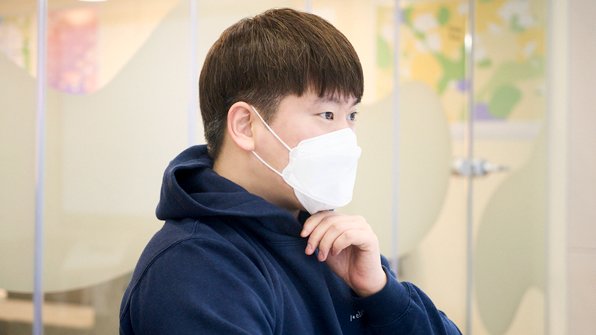Caring about people reaches out through education - Technical Product Owner Hojeong Lee
Elice
19/04/2022
Q. Hello, Hojeong. Please introduce yourself.
I’m Hojeong Lee, Technical Product Owner at KDT, where we run the Elice Track and follow a racer’s* career journey from start to finish.
*A trainee at Elice Track, a developer training program.
Q. Hojeong, you joined Elice after completing the training yourself, what made you join the company?
I joined Elice after attending a training program in Seocho-gu, Seoul. I wanted to understand the technology because my goal is to eventually start my own business. The person I studied with recommended Elice to me when he joined Elice. I wanted to gain a lot of experience working in early-stage startups for my future business.
Q. Since joining Elice, you’ve worked in a variety of roles. Please describe your first role.
When I joined the company in 2020, there were about 26 employees in total. Initially, I was part of the now-defunct Internal Operation team, running a job placement program called "AI College," which was a collaboration with the "AI Couture Hub," which fosters artificial intelligence startups, and provided about 50 people with AI theory and practice for three months. From there, I was in charge of everything from managing trainees to recruiting educators, planning job placement events, recruiting companies, and communicating.
A proactive person who doesn’t get stuck in the word "operations.
Q. After running coding tests and incumbent training, you came to the KDT team, which trains developers. It seems difficult to limit the work you do in the KDT team to one word, "operation." You are in charge of many tasks, from planning to management. Please tell us what your current tasks are.
As you said, I have a very wide range of responsibilities. I think I came to the KDT team because I had all the experience I needed to run the Elice Track before. The AI College was smaller than the Elice Track, but it had the commonality of collective education and job placement, and we still use a lot of the same methods of operation.
In terms of what I do, I create career-building programs to make racers more employable. To help racers get jobs, I find companies with hiring needs and participate in the development of our recruitment platform, Eliceworks. I also run the alumni community and interact directly with racers of all stripes. Finally, I create written and video content to promote Elice tracks and racers.

Q. You’ve been involved in every aspect of Elice Track’s operations from its inception to now, what have been some of the biggest changes and accomplishments:?
In the early days, every day was a struggle, and I don’t think we fully realized the impact of the education we were providing. As time went on, I realized that our job wasn’t just about giving out study materials and managing schedules, it was about changing a person’s life. There were so many things to consider because we were part of such an important process.
This gave me a broader perspective as an individual, and gave us a system and know-how as a team. As we accumulated more cases and realized more things, we had a clear direction for our work. Of all the teams at Elsevier, we were the closest to the end users, so we were able to make steady progress in dealing with and understanding them.
Technically, I’ve gotten better at utilizing data. We now closely monitor our racers’ individual engagement and performance, but in the beginning it was a bit lacking. As we operated, we needed an objective way to understand our racers in order to create training that they really needed. We created a dashboard to keep track of attendance, progress, test scores, and other metrics. We also do a weekly training satisfaction survey to get individual feedback from racers. The team is constantly looking at the data to help us decide how to structure the curriculum, how many lab questions to create, when to release question commentaries, and much more.
Q. Racers who have participated at Elice say that Elice is run differently than other tracks. Do you think your major (psychology) has helped you in this regard, and what do you think is necessary for a successful operation?
I think my major has helped me a lot, because when you’re running a big training program, efficiency is important, but it’s equally important to have an individualized understanding of the people you’re training and a qualitative attitude. So I try to understand racers not just by the numbers like progress rate and attendance rate, but by their goals and challenges, and put myself in their shoes. I think about the words I use to communicate with racers and the way I reach out to them, because even if I’m saying the same thing, the way I say it and the way it’s received will make a difference. Basically, I’m always thinking about how to make racers feel like Elice is someone who supports them and a friend they want to be with.
Making a positive difference in someone’s life
Q. What was the most rewarding part of planning, promoting, and managing the program from developer training to job placement:?
I’m the go-between for racers and companies to get their feedback to the development team. This role is motivating and rewarding in and of itself, as I’m the closest to the customer’s voice and contribute to the evolution of the product and service, and I get to interact with the developers along the way and improve my technical understanding.
But the most rewarding part is when racers say things like, "Elice got me the job," or "I was going to quit halfway through, but you pushed me to finish." In fact, there’s a lot more to running a training program than the big, glamorous things - there’s a lot of small tasks like taking attendance and registering materials that often don’t feel fun and motivating, but that changes when you understand what you’re trying to accomplish and how your work impacts that goal. It’s the little things that add up to big results, so experiences like this that make us feel like we’re making a positive difference in a racer’s life are invaluable.
Q. Please tell us about your know-how regarding the operation of the Elice Track.
When I talk to racers, I try to put myself in their shoes so that they feel like they’re getting the attention they deserve. Everyone has different prior experiences and career plans, even if they’re going through the same education, so I keep all of their materials open, whether it’s studying, career counseling, or just talking to them. I look at their personal statements, their career plans, their personal portfolios, their attendance and learning, their project teams and scores, and I look at their reasons for choosing their current career path, their learning patterns, their biggest challenges, their non-development interests and strengths, so that I can really get to know their needs. For example, they may want to stop working on a team project, but their reasons may be completely different. If you have less development experience or skills than your teammates, it’s likely because you feel sorry for them and frustrated, and you need to remind them of their goals, cheer them on, and offer ways to build their skills. On the other hand, if you have a clear career plan and are looking for a job, you may feel like you don’t need to spend time with someone who has different plans than you. In this case, you’ll want to make your case based on why you need to work together and how it will help you in your future endeavors.
Above all, talk to them enough to make them feel like you’re genuinely looking out for them. When the conversation moves on to other topics, ask if your previous concerns have been addressed. It’s like talking to a friend and asking how they’re doing based on past experiences together.

Q. To promote the Elice Track, you also interviewed for the YouTube series "Startup Connections," which introduces startups that are great places for developers to work. What did you learn from meeting the practitioners?
The starting point for the ‘Startup Connections’ interviews was a program I used to run at AI College called ‘Gathering Day’. The program was designed to introduce AI College trainees to startups that lacked scale and name recognition, but had the technology and potential to grow. We invited the CEO or CTO of the company to present the company to the trainees. We had 10 companies, and 6 of them hired our trainees, which was beneficial for both the trainees and the startups. So for the Elice Track, we wanted to bring in some bigger companies to do the program. The idea for the interview content came from Soo-Kwang from the brand communications team, and he said, "Let’s do a video to tell the story that we didn’t get to tell in the hour-long program." I had experience interviewing trainees and educators before, so I thought I could do it.
Connecting Startups gave me a better understanding of what new developers need. When I write interview questions, I focus on things that can help a racer. One thing you emphasized across companies is the fundamentals. In fact, since bootcamp is a short-term learning and employment process, you might think that you just need to learn the tricks, but it’s really important to have the basics because you can apply them in the real world. This interview made me think a lot about the nature of education, and I sincerely felt that we shouldn’t just care about the immediate employability, but we should honestly train trainees to build fundamental skills.
Growing all-around players
Q. Recently, you have become an ‘all-around player’ as a PO of developer recruitment platform ‘Eliceworks’. It is important for a PO to have experience in everything from planning to running an organization, how did your previous work experience help you in your role as a PO?
As the saying goes, "a PO is the CEO of a small startup," and I feel like I’m utilizing the totality of my experiences so far: listening to the voice of the customer and incorporating it into our operations, recommending features to the development team, promoting our services to potential customers and suggesting they use them, and building relationships with our customers so they feel satisfied and connected to our services. My work experience at Elice Tracks has been useful in everything I’ve done, especially since Eliceworks is a recruitment platform, which means we have to consider the needs of both customers, job seekers and employers. I’ve had a lot of interaction with trainees and employers at Elice Tracks, so I’ve been able to quickly determine what they need, and I’m looking forward to using my experience as an Eliceworks PO to bring a technical perspective to the process of creating Elice Tracks’ training, as I’ve been involved in the development of the platform from the very beginning.
Q. As a PO, you work in an agile organization with a diverse team of developers, designers, and others. I’m sure you’ve seen a lot of self-directed Elysers along the way. What has it been like working with these Elysers?
It’s great to work with good, hungry, hardworking people. At Elice, even if you’re new, you have a big role and responsibility in the product. They really work hard like it’s their job, so when we’re building a product and there’s a challenge, I know it’s going to be solved eventually, because we’re all trying to figure out how to do it, and it’s fun to struggle together.

Q. Hojeong, if you think there is a culture that Elice is proud of, please tell us.
Elice gives a lot of opportunities to grow. If you want to run a company safely, you should only give roles to proven people, but Elice is different. They trust you and give you a chance, and I think that gives you a sense of responsibility and motivation to do your best. That’s how the individual and the company grow together in a dynamic way, and I think that’s the beauty of Elice.
##With a warm heart, a cold head
Q. Tell us about your dreams for Elice, and if you have any personal end dreams.?
I want to put Eliceworks on a stable trajectory. I’ve talked to some of our racers and I’d like to create a "racer mafia." Like the "PayPal mafia" in Silicon Valley, I’d love to see racers who have gone through the Elice track go out and lead the way in their respective fields, and I’d love to see the racer community be the first place they turn to when they need help or peers.
On a personal level, my ultimate dream is to start a foundation. I want to support children who can’t get an education due to environmental factors, and I want to support artists and scholars who are studying fine arts or academics. I originally wanted to be a painter or a psychologist, but I gave up because I was worried about my financial stability. I want to make sure that no one has to give up on what they want to do, because I think it’s so sad when external factors prevent people from fulfilling their potential, and I believe that the world would be so much more colorful and rich if everyone did what they love and are good at, so I agree with what Jae-Won always says, "Diverse companies are more successful in the long run.
Q. Is there anything you’d like to say to people who are considering applying to Elice?
The two words I would emphasize to anyone applying to join our team are ‘people’ and ‘education’. Our team exists to open up opportunities for people through education, so it’s a cliché, but we want people with a warm heart and a cool head - people who really care about learners and think about how they can help them. I’ve seen over and over again that when you put your heart and soul into people, it’s hard work, but it pays off. If you don’t have a lot of technical knowledge, don’t worry if you don’t have a lot of technical knowledge because you’re going to be running training.
To anyone applying to Elice, I would say that it’s a place where you get out of it what you put into it, and I put in the maximum effort to get the best out of my work, and I think that’s what’s allowed me to get new opportunities. I look forward to working with people who want to put in the best effort and get great results!
*This content is a work protected by copyright law and is copyrighted by Elice.
*The content is prohibited from secondary processing and commercial utilization without prior consent.
- #job
- #tech
- #elicer






